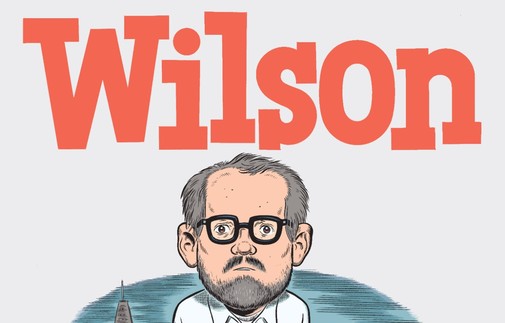Review: "Wilson"
 Sunday, March 26, 2017 at 12:30PM
Sunday, March 26, 2017 at 12:30PM Daniel Clowes struck gold in 2001 when he wrote the screenpay for Ghost World, an adaptation of his graphic novel of the same name. Telling the story of self-identified outcast Enid (Thora Birch), his first screenplay toyed with themes pertaining to isolation, the dissolution of friendships, and lots and lots of teen angst. It was relatable and altogether melancholic, but importantly-- it all worked. Drawing from his own work (no pun intended), Clowes pulled together some all-too-familiar film tropes, and managed to subvert them in thoughtful and oftentimes amusing ways. After a return to the screen with another adaptation of his own work, Art School Confidential in 2006, Clowes layed low, working primarily on writing/drawing and short films. He's back with Wilson, now in theaters, pairing with The Skeleton Twins director Craig Johnson, for another foray into the hilariously damaged human spirit...
The story is straightforward. The film's leading character, aptly named Wilson (Woody Harrelson), waxes philosophic on the abysmal state of human interaction, claiming that we have lost touch with one another. To counter the "social media addicted" culture, he chooses to join stangers at the same coffee shop table or the adjacent urinal in order to strike up conversations. After his only friend moves away and his father dies, he reaches out to his ex-wife Pippi (Laura Dern) for another human connection-- only to find that she had previously had the baby he thought she had aborted. What ensues is a "wild" and "wacky" pursuit for Wilson and Pippi to reconnect with their 17 year-old daughter, Claire (Isabella Amara).
Harrelson and Dern make for a formidable team, playing off each other's eccentricities to the best of their ability. It's refreshing to see Harrelson get his own star vehicle and stretch out his skills as a leading man. The actors are quite good. Therein lies the film's biggest letdown: sadly, Clowes' screenplay. Using oddly placed voice-over, we are clued into Wilson's state of mind, not through Harrelson's performance, but by what he explicitly states to us. At times, this feels like a lazy ploy to get us to know precisely what to feel. "Hey, did you know that we have lost connection with one another? No? Well, don't worry, because Wilson is going tell us now. Again."
The meandering storytelling that Craig Johnson utilizes does work intermittently. For instance, both Lauren Weedman (Emmy snubbed for her performance on Looking) and Margo Martindale sparkle in their one scene apiece. They play seemingly minor characters in Wilson's narrative; Weedman playing a woman Wilson is so desperate to go on a date with that he rear ends her car, and Martindale playing the woman who shows interest in Wilson after Weedman's character publicly shames him for hitting her car. Perhaps I was longing for a film about these two women instead, but in any case, they offer a glimmer of the humanity that Wilson claims to want, but then denies.
This leads to the film's most glaring issue. Around every corner, with each passing plot point, the film works against itself constantly. We watch as Wilson almost literally claws at every single person he meets, attempting to forge some sort of relationship. The voice-overs indicate that Wilson is interested in connecting with the world around him, that he wants something meaningful. The problem is, Wilson is an incredibly toxic character. And while it would have been fascinating to watch Craig and Clowes play with these inconsistencies, to make this contradiction look intentional, they leave this area of the film unexplored.
For a film focused on what attaches us to one another, there was so much room to examine these crucial relationships Wilson shares-- with Pippi, with Claire, with his dogsitter Shelly (Judy Greer). Hell, I would've been okay with Clowes telling us more about Wilson's dog, Pepper. Instead, we are left with sad-sack, snarky Wilson quips that only work to distance him further from those he loves.
Maybe that was the point after all, but in a film that jarringly jumps from sentimentality to slapstick in the same scene, these contradictions do not feel entirely realized in the grand scheme that is Wilson.
Clowes has had an uncanny ability to dig into the most unlikeable recesses of his characters' minds and explore how those qualities make them human. But he only begins to scratch the surface of Wilson, leaving us with ambivalence and a general sense of confusion. While Ghost World defied the tropes that defined its genre, Wilson cannot seem to escape itself. And perhaps that is a fate worse than actually having to endure a conversation with Wilson in the first place.
Grade: C-






Reader Comments (2)
Shame.
You said about the same thing I did. Disappointing as I loved Ghost World and The Skeleton Twins.